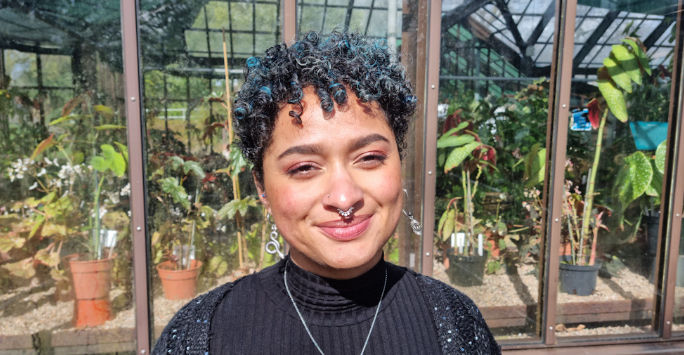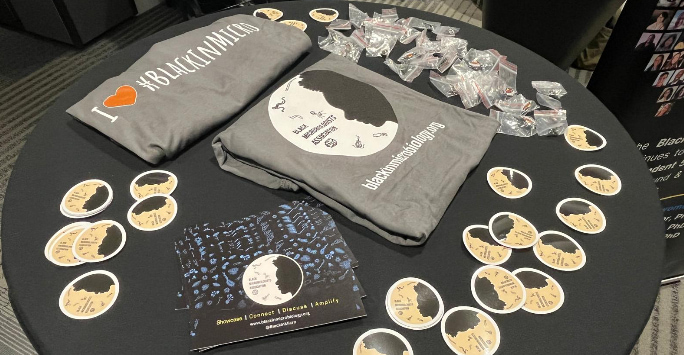
I’ah Donovan-Banfield is a final year PhD student in the Department of Infection Biology and Microbiomes. She recently attended the American Society for Virology Annual Conference in Columbus, Ohio and told us about her trip and current research.
My research
I joined the Hiscox Lab in March 2021, as a PhD student within the NIHR Health Protection Research Unit in Emerging and Zoonotic Infections (HPRU EZI). My project has been centred around characterising the potential for antiviral drug resistance to mutagenic drugs used to treat SARS-CoV-2.
Mutagenic antiviral drugs, also known as nucleoside analogues, mimic naturally occurring nucleotides (A, G, C or U in the case of RNA viruses), which viral replication enzymes incorporate into the new viral genomes they produce. These nucleoside analogues induce an increase in mutations in the viral genomes above the threshold at which the virus can survive, a phenomenon known as lethal mutagenesis. Understanding the limits of the lethal mutagenesis mechanism in real-world applications (i.e. approving these drugs for the treatment of COVID-19) is important for understanding antiviral drug resistance and evolutionary risks.
American Society for Virology (ASV)
I attended the 43rd ASV Annual Conference hosted by Ohio State University in Columbus, Ohio. The meeting provides a forum to promote discussion and collaboration among scientists active in all aspects of virology, both within and outside the USA. The conference had 62 workshops across 5 days, spanning topics from ‘Novel Methodology & Technology’ to ‘Evolution, Ecology and Reservoirs’. There were also several satellite symposia on the first day, of which I attended ‘Studying Bats Using a One Health Lens: Bridging the Gap Between Bat Virology and Disease Ecology’. This was a fascinating whistlestop tour of all the incredible work dedicated to understanding the unique risk of zoonotic spillover from wild bat populations that exist and ways to limit said risk. I made sure to attend this symposium as it is an area of research I would like to pursue for postdoctoral work.
Presenting my research
I was delighted to be selected to deliver a 15-minute talk at the ‘Coronaviruses & Arteriviruses IV’ workshop. I showcased one of my PhD projects, which involved characterising the impact of molnupiravir on SARS-CoV-2 genomic diversity. I used data from clinical trials as well as global population data from SARS-CoV-2 sequence databases. By employing established sequencing protocols and customized data visualization, I confirmed the mechanism of action of molnupiravir, showing an increase in G to A and C to U mutations. These mutations were part of the exploratory endpoint of the AGILE phase II clinical trial that assessed the safety and efficacy of molnupiravir. I also presented data from a collaboration with other early career researchers, where we used AGILE clinical trial data as a positive control to identify global SARS-CoV-2 sequences sharing the molnupiravir mutation signature.
My presentation resulted in captivating discussions during the Q&A session and throughout the rest of the conference. I was approached by several researchers who were interested in discussing my research and potential collaborations, as well as inquiring about the data visualisation pipelines I developed for my project.
Building an inclusive environment for Black scientists
In addition to my involvement in the scientific programme, I also represented the Black Microbiologists Association (BMA) as the Director of Public Relations. The BMA was established in response to the ongoing underrepresentation of Black individuals in microbiological education, training, and research globally. My role initially began as a member of the public relations committee for the inaugural Black in Microbiology Week in 2020, a virtual celebration of Black microbiologists. I now have the privilege of leading the PR committee and collaborating with the Programming Committee to produce ‘The Black Agenda’ at prominent microbiology conferences, which serves to spotlight the work of Black microbiologists, provide details of BMA events and workshops, and promote local Black-owned businesses. The Black Agenda had its debut at the American Society for Microbiology conference last year in Houston, Texas.
At ASV 2024, we created and facilitated the Diversity, Equity and Inclusion (DEI) Workshop entitled ‘Supporting and Advocating for Black Virologists’. We encouraged attendees to reflect on the disparity in opportunities that Black scientists face and ways to effectively provide allyship. We had 138 attendees and lots of positive feedback, both from the attendees and the ASV DEI committee which we’ll use to create similar events at future microbiology workshops.
Overall, I am incredibly energised by the opportunity to attend ASV 2024 and believe it has expanded my professional network in ways I would not have been able to achieve otherwise. The scientific feedback I received could not have come at a better time as I prepare to wrap up my thesis writing and prepare myself for future endeavours. I would like to thank the HPRU EZI for funding my travel and attendance at ASV 2024.
